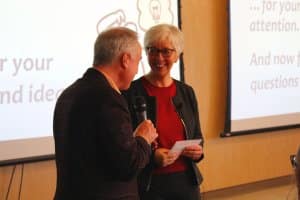Imagine you are heading to work one morning. As you arrive at your building, a young man is exiting in a wheelchair, and you notice there’s no button to open the door for him.
Later that same day, while out for a walk, you see a middle-aged woman walking down the street who appears confused and lost. She is coming up to a busy intersection and you are not sure if she needs help to get across the street.
As you return to the office, you overhear colleagues discussing interviewees for a position in your department. It sounds like an interviewee with a disability won’t be getting a call back because your colleagues believe the person cannot do the job.
 How you respond to each of these situations is shaped by your attitudes towards disability. Attitudes are part of the way we encounter the world. They represent a split-second evaluation of a person or situation, and they are made up of both a thought and a feeling, according to Dr. Mary Ann McColl.
How you respond to each of these situations is shaped by your attitudes towards disability. Attitudes are part of the way we encounter the world. They represent a split-second evaluation of a person or situation, and they are made up of both a thought and a feeling, according to Dr. Mary Ann McColl.
Dr. McColl, who teaches in the School of Rehabilitation Therapy at Queen’s University and researches disability policy, recently spoke to a crowd of healthcare professionals about attitudes towards disability as part of a Lunch and Learn series created by Bergeron Clifford Injury Lawyers and held at Providence Care.
To help these professionals in their important work, she says we need to understand both the prevailing attitudes in Canada towards disabilities as well as our own preconceptions.
“As good as things are in Canada, attitudes toward disability can still present a significant barrier to full participation for persons with disabilities,” she explains. “Reaching out to opinion leaders like healthcare professionals is one way we start to make things better. So, my purpose in presenting today was to offer them fuel for their mission to make the world a better place for their clients and patients.”
According to research cited by Dr. McColl, a third of Canadians understand and are actively engaged with disability issues. She estimates that these probably include the one in seven Canadians who live with a disability, as well as those directly supporting them.
At the same time, about half of Canadians are generally supportive, but largely unaware or inactive in relation to disability issues. Dr. McColl believes that in order to promote positive attitudes toward disability, there must be more effort to win the hearts and minds of this silent majority, and to equip them to know how they can help.
 Part of achieving this comes down to understanding attitudes, and to realizing that the usual tried-and-true methods for changing attitudes don’t work. It has been shown through research that public awareness campaigns and disability simulations are largely ineffective at changing attitudes – mostly because they focus on either the cognitive or the emotional side of attitudes, but not on both.
Part of achieving this comes down to understanding attitudes, and to realizing that the usual tried-and-true methods for changing attitudes don’t work. It has been shown through research that public awareness campaigns and disability simulations are largely ineffective at changing attitudes – mostly because they focus on either the cognitive or the emotional side of attitudes, but not on both.
Dr. McColl presented six approaches to improving attitudes toward disabled persons. One of the most effective approaches is to simply offer opportunities to spend time with people with disabilities as they go through their normal daily routines or as they participate in active lifestyles. Another promising strategy is to positively influence the attitudes of children before they develop stereotypes and fixed ideas. Dr. McColl’s forthcoming book, Appreciative Disability Studies (Captus Press, available March 2019) details many ways that health professionals can participate in making Canada a more inclusive and equitable place for people with disabilities.
For information on future Lunch and Learn events, or other updates from Bergeron Clifford Injury Lawyers please contact us.